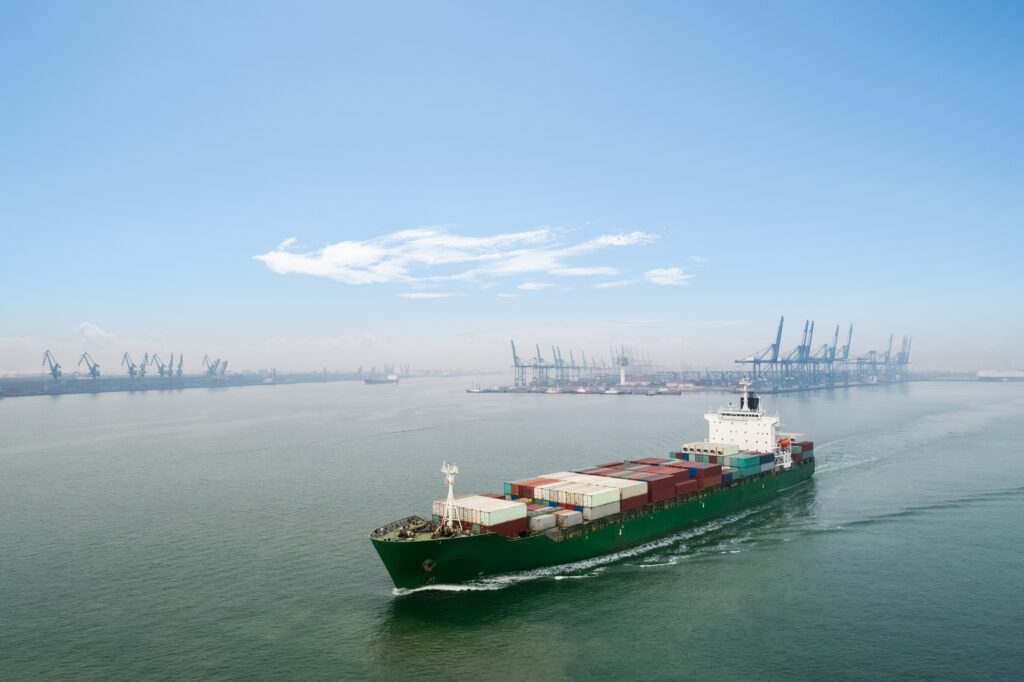Polyurea coatings are coming into wider use across many industries and the marine industry is no exception. Polyurea and the shipping industry go extremely well together. Above and below the water line, these coatings can be very effective in protecting steel, aluminum, and fiberglass. Polyurea is excellent at providing protection from the elements and anything that qualifies as maritime, offshore, or nautic can be protected by these coatings.

No other industry deals with the same multitude of factors that the shipping and maritime industries do—extreme temperature fluctuations, expansion and contraction of materials, moisture problems etc. As a result, these industries set high standards for paint systems and coatings. Polyurea can be applied to increase the longevity and reduce the maintenance required of decks, hulls, ballast tanks, filling floats, freezing and cooling rooms, water tanks, holding tanks, fish hold liners, bilge liners etc.
Top Reasons for Using Polyurea Applications in the Marine Industry
Polyurea is an incredibly versatile and durable protective coating that can be used for a number of applications across a variety of industries. If you’re looking for an exceptionally long-lasting waterproof and protective solution, then polyurea coatings are the right choice. These ultra-high-strength, elastomeric coatings outperform other coatings that have been traditionally used such as polyurethanes, epoxies, and other hybrid products. Here are a few reasons why polyurea is so widely used in the marine industry.
Protects the Lining of Interior Compartments
Ships transport a lot of goods such as grains, aggregates, liquids, and even military and marine equipment. These items must be protected from the elements, most notably water, at all costs to maintain their freshness and prevent them from sustaining damages.
Polyurea can be used to protect the hull of the boat where these items are stored from exposure to external elements and water leaks. It will also protect the containment area from abrasive goods such as aggregates. Polyurea makes it easier to keep the hulls clean and free of contaminants that can spoil goods during the transportation process.
Protects the Body from Corrosion and Damage
No other part of the boat gets more direct water exposure than the external body and therefore, it needs the most protection. In addition to water, the exterior of the boat also comes into contact with strong winds, large and small projectile objects, and even rogue birds and other animals.
There are areas on boats where, during normal fishing and offload activities, a standard coating would be destroyed by the repeated impact of hard, heavy objects. Once the coating is destroyed, it is hard to stop rust from spreading. Additionally, polyureas provide a chemical-resistant lining for storage tanks, pipes, and cargo areas. Polyurea coatings will last for years without failure, preventing rust and corrosion that can damage the exterior and interior of a water vessel.
Quick Turn Around Time
Polyurea coatings are ideal for marine applications for many reasons, one of them being the need for fast job turnaround in dry dock to keep repairs and upgrades on schedule. Polyurea’s quick cure times play a big role here and polyurea will hold up where other systems will fail.
The fact that polyurea coatings are not sensitive to humidity and moisture during curing means they can be applied within a wider window of weather conditions and temperatures than other coating options. Polyureas also are an excellent choice when fast curing applications are applied in high humidity or low temperature conditions and where high film build and extreme abrasion resistance are required.
Protects Against UV Damage
Many water vessels log countless hours at open sea and that typically means a lot of exposure to UV rays from the sun. Damage from UV rays can strip away the exterior paint, exposing the mechanisms and materials beneath the surface to potential corrosion and rust. Aliphatic versions of polyurea coatings are UV stable and provide a cost-effective solution to preventing UV damages by forming a strong, cohesive, and impenetrable barrier.
Reduces Maintenance Frequency
The more precautions you take to protect your vessel against water damage, the longer it can go without necessary maintenance such as part replacements and repairs. Boat maintenance can be extremely expensive, and the frequency depends on how many hours the vessel spends on the water. As a general rule of thumb, boats should be serviced after every 100-hour interval to guarantee optimal performance and that all safety standards are up to date.
Polyurea protective coatings for boats and ships can help keep maintenance requirements to a minimum by limiting direct exposure to damaging elements.
Lowers Environmental Impact
Unlike other waterproofing protective coatings such as polystyrene foam that’s typically used to safeguard marine vessels, polyurea is completely eco-friendly. Designed with marine life and other environmental elements in mind, polyurea is a sustainable coating that doesn’t release harmful gasses such as CO2 into the environment during its production.
Polyurea can be constructed to be climate-neutral through the use of raw materials and renewable energies. Marine life and species that come into contact with watercrafts that are sprayed with dried polyurea coatings won’t be disrupted or harmed by its presence.
Increases the Value of Your Water Vessel Over Time
Maritime traditions dictate that vessels should be named in succession of one another. Modern ships are typically named after older vessels that have been retired, which is why you’ll see multiple generations of ships with the same name passed down.
The average lifespan of a watercraft that’s well cared for and maintained is about 25-30 years before it’s surrendered for scrap metal. Ships are typically built with welded steel and their designs include all of the modern fixtures required to perform specific tasks. Proper maintenance and polyurea applications can help maintain and extend the lifespan of a marine vessel.
Protects Equipment from the Elements
Ships contain equipment such as large cranes, floating docks, navigation devices, and more. All of these pieces of equipment will inevitably be exposed to seawater at some point during the voyage. External components of the boat that are made of metal can develop rust and corrosion over time. Polyurea protective coatings prevent this from happening
Where to Get Industrial Polyurea Protective Coatings in Canada
IMC Distributors is the exclusive partner of ISOMAT S.A. and Nukote Coating Systems in Canada. Our polyurea products can be used for a wide range of marine applications to protect onshore and offshore infrastructure, vessels, and equipment. We provide state-of-the-art protective waterproofing solutions that are guaranteed to increase the efficiency, functionality, safety standards, and lifespan of whatever they coat. Contact us today to learn more.
 Karli Logan is the Owner and President of IMC Distributors which is the exclusive partner of Nukote Coating Systems in Canada. With a B.Sc and M.Sc, as well as a demonstrated history of working across a number of industries, she has a passion to drive significant gains and benefits for IMC’s clients.
Karli Logan is the Owner and President of IMC Distributors which is the exclusive partner of Nukote Coating Systems in Canada. With a B.Sc and M.Sc, as well as a demonstrated history of working across a number of industries, she has a passion to drive significant gains and benefits for IMC’s clients.